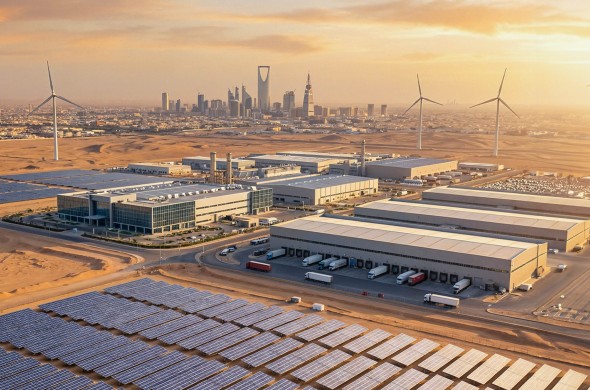The Ripple Effects of the U.S. Fiscal Expansion Act: Strategic Implications for Middle Eastern Industries
The recently passed U.S. Fiscal Expansion Act, a sweeping tax-and-spending billis poised to significantly reshape America’s economic framework over the next decade. It not only extends the 2017 Tax Cuts and Jobs Act (TCJA) but introduces a raft of tax breaks alongside major spending cuts, all while pushing the U.S. deficit to a projected $3.3 trillion increase. While the domestic implications have sparked heated debate across party lines, the bill’s global ramifications are less explored, especially for Middle Eastern economies deeply tied to the U.S. through trade, investments, and currency pegs.
For the Gulf Cooperation Council (GCC) countries, Saudi Arabia, the UAE, Qatar, and others, the law’s ripple effects will be particularly felt across five sectors that form the bedrock of their economic diversification strategies: agribusiness, public services, FMCG, consumer goods, and real estate. This article outlines how businesses in these areas should readjust priorities, anticipate externalities, and reposition strategically.
Agribusiness: Supply Chain Stress and Innovation Pressure
Agriculture in the GCC has long been a strategically subsidized sector, often shielded from volatility by state-backed food security initiatives. However, with the U.S. introducing tariffs on several agricultural goods and scaling back incentives for sustainable farming, two significant consequences have become apparent. First, the cost of imported food and agricultural inputs is expected to rise. Second, the cost of advanced farming technologies sourced from the U.S. or its trade partners also escalates due to retaliatory measures or new trade barriers.
These pressures are likely to slow down the pace of transformation in GCC agribusinesses unless alternative supply chains and indigenous innovation systems are cultivated. Regional governments and firms need to reassess their reliance on external inputs and increase investment in localized R&D, machinery production, and agri-tech partnerships within Asia or Europe.
Public Sector: A Shift Toward Fiscal Prudence
Although oil-rich governments in the GCC continue to announce large public sector initiatives, the Fiscal Expansion Act sends important global signals. The U.S.'s increased borrowing will likely push global interest rates higher. In response, sovereign funds and public infrastructure bodies in the Middle East will have to become more conservative in their spending.
Increased global borrowing costs could make it more expensive for GCC countries to finance large infrastructure or social welfare projects, even with robust oil revenues. Additionally, the lure of higher returns from U.S. Treasury bonds causes regional investors to divert capital away from local development projects, further tightening the financial landscape for public sector expansion. This will force governments to prioritize high-impact, locally rooted initiatives and rely more heavily on private sector partnerships to execute large-scale projects.
FMCG and Consumer Goods: The Cost-Conscious Gulf Consumer
Middle Eastern consumers are already grappling with inflation, and the U.S. bill’s secondary effects could exacerbate that. As tariffs increase the cost of American imports and global inflation bleeds into dollar-pegged currencies, consumer behavior is expected to shift.
The rising cost of imported goods will likely reduce consumer purchasing power, prompting a pivot toward locally made or regionally sourced alternatives. Companies operating in the FMCG and consumer goods sectors need to recalibrate their product portfolios to accommodate more cost-effective offerings. Simultaneously, there will be pressure on suppliers to streamline operations and find efficiencies in logistics, packaging, and distribution to maintain competitiveness in a price-sensitive environment.
Manufacturers and retailers also need to shift marketing strategies, emphasizing affordability, utility, and local identity over brand prestige and international quality standards. This evolution could, in the long run, strengthen the market position of regional brands and reduce dependence on imported goods.
Real Estate: Recalibrating Capital and Confidence
The Fiscal Expansion Act’s impact on global interest rates and U.S. dollar strength could reshape real estate investment dynamics in the GCC. Higher global borrowing costs challenge developers in the Middle East who rely on syndicated loans or international project finance structures. As capital becomes more expensive, real estate projects experience delays or reconfigurations in scale, scope, or ownership structures.
However, a stronger dollar could enhance the purchasing power of GCC sovereign wealth funds, which double down on real estate investments in strategic geographies or sectors. Conversely, domestic projects could face financing shortfalls if capital flows are redirected. The net effect may be a more cautious investment environment where only the most strategically vital or financially robust projects proceed. This could lead to a healthy recalibration of the real estate landscape, aligning project outcomes with long-term urban planning goals and actual demand.
Governments also increase support for affordable housing, infrastructure, and green building technologies to drive domestic growth amid a less favorable global funding climate. Real estate developers and investors must adapt by embracing flexible financing models and exploring joint ventures to maintain project momentum.
Strategic Implications: Rethinking the U.S. Anchor
The Fiscal Expansion Act is more than a tax policy—it reflects an America-first economic doctrine with protectionist leanings and a willingness to tolerate long-term debt in exchange for short-term growth. This creates three strategic imperatives for Middle Eastern businesses:
- Diversify Supply Chains: Companies in agritech, retail, and construction must reduce over-reliance on U.S. suppliers and diversify toward Asia, Europe, and intra-GCC partnerships.
- Accelerate Localization: There is an urgent need to invest in local manufacturing, agricultural resilience, and indigenous technology to reduce exposure to international cost pressures.
- Adopt Risk-Adjusted Investment Frameworks: With global debt and interest rate cycles likely to become more volatile, businesses and public institutions should embed greater risk analysis into capital allocation, balancing return expectations with exposure to macroeconomic shocks.
Conclusion: A Pivot Point for the GCC
The U.S. Fiscal Expansion Act is a litmus test for the Middle East’s resilience and adaptability. While short-term challenges arise in the form of inflation, increased import costs, and altered capital flows, there are also opportunities to deepen regional value chains, invest in strategic autonomy, and build sustainable competitive advantages.
For businesses in agribusiness, public services, FMCG, consumer goods, and real estate, this is a moment to lead with agility and foresight. The time has come to look beyond the U.S. as the sole economic anchor and build a multi-polar strategy that ensures stability, growth, and innovation in an increasingly interconnected and volatile world.
Read our latest insights, ideas, and perspectives that explore the trends shaping the future of business and society. Our consultancy services go hand-in-hand with these insights, confirming our position as industry leaders. Get in touch to find out more about our consulting services and industry expertise.



